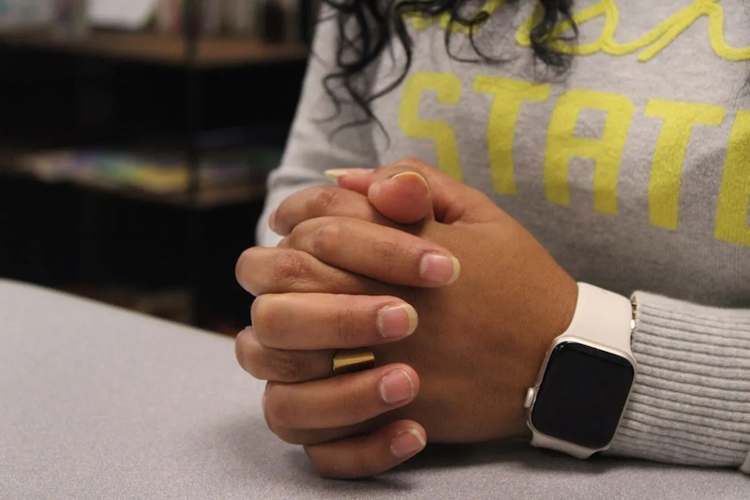Spotlight Delaware is a community-powered, collaborative, nonprofit newsroom covering the First State. Learn more at SpotlightDelaware.com.
Isabela wondered how she would reach the oxygen mask above her head in case of a mid-flight emergency. She imagined the yellow mask dangling idly as she helplessly tried to raise her arms above her head, 30,000 feet in the air.


Her hands were cuffed to a chain around her waist, after all.
Isabela listened as the flight crew detailed what to do in case the cabin lost pressure during the commercial flight to an immigration detention center in Louisiana. After the instructions, another passenger loudly asked why they were hearing a presentation if they couldn’t do anything with their waists, hands and legs entwined in chains.
A federal agent then walked over and said, “Just ask God.”
U.S. Immigration and Customs Enforcement agents had arrested Isabela days earlier inside her Sussex County home. The ICE agents had burst into her house in the middle of a March night – without presenting an arrest warrant – looking for her brother.
Spotlight Delaware is identifying the woman interviewed for this story under the pseudonym of “Isabela” in order to protect her identity and in response to her fears of persecution and retaliation.
The agents arrested the mother of two — who has no criminal history — in front of her children as they searched the house. They didn’t ask about Isabela’s immigration status before she was taken away in handcuffs as a collateral arrest.
Isabela was living in Delaware under the legal protection of “deferred action” as part of the lengthy U visa process, which helps victims of crime who assist law enforcement in catching criminals. Other U visa holders across the country, who have temporary legal status, have also been detained and deported as part of the Trump administration’s sweeping immigration crackdown.
It’s not something good that’s waiting for me.
Isabela, The woman interviewed under a pseudonym for this story
As a victim of domestic violence, Isabela helped police find, prosecute and deport her ex-husband who stabbed her in 2019.
“ICE refused to recognize the temporary status that she was granted,” said Emily Houde, a supervising attorney with the immigration unit of Community Legal Aid Society Inc., a nonprofit that provides free legal services to vulnerable Delawareans.
When reached for comment, ICE asked Spotlight Delaware to disclose Isabela’s identity before commenting. To protect Isabela’s anonymity, the newsroom declined. The agency did not respond further to requests for comment on Isabela’s story.
Now, on the plane heading for Louisiana, Isabela found herself on a path leading directly back to her ex-husband — her abuser — who was waiting in their Central American home country three months after he was deported.
“It’s not something good that’s waiting for me,” Isabela said.
The Crime
Isabela hadn’t seen the knife in her husband’s hand.
Late one August 2019 evening, he stood in the doorway leading out to the alley behind their home, beckoning Isabela to come closer.
She questioned him over and over. Why did he want her to step into the alley, she asked. He was upset about how Isabela had reprimanded their son earlier that day.
The confrontation was the culmination of her husband’s years-long attempt to control nearly every aspect of her life: how she dressed, who she spoke to, and if she worked.
“If I went out to that little alleyway, I think he would’ve killed me,” Isabela said.
After she refused to come outside, Isabela’s husband instead charged in. He grabbed her arm and forced her onto the bed. The two struggled back to their feet, and she stood in front of him.
Then he dug the blade into her ribs.
Her husband pulled out the knife and was going to stab her again, but the blood-soaked blade slipped from his hand and fell to the floor.
It wasn’t until she looked down at the blood seeping through her shirt that Isabela realized she’d been stabbed.
Her husband fled soon after. He wouldn’t be caught and convicted for another five years.
Isabela filed a police report and began the U visa process with CLASI and Delaware Attorney General Kathy Jennings’ office.
 Delaware Attorney General Kathy Jennings. | SPOTLIGHT DELAWARE PHOTO BY JOSE IGNACIO CASTANEDA PEREZ
Delaware Attorney General Kathy Jennings. | SPOTLIGHT DELAWARE PHOTO BY JOSE IGNACIO CASTANEDA PEREZA U visa allows undocumented victims of crime to live and work in the U.S. for up to four years and places them on a pathway to citizenship. The status is intended for crime victims who have suffered mental or physical abuse and are helpful to law enforcement during the investigation.
Congress created the U visa through bipartisan legislation in 2000 in order to bolster law enforcement’s ability to prosecute cases of domestic violence and sexual assault while helping protect victims of those crimes.
There’s a cap of 10,000 U visas per year, which has led to a years-long backlog in applications. As of March 2025, there are 412,815 pending U visa petitions, according to U.S. Citizenship and Immigration Services data.
The Detention
The ICE agents’ boots sounded like horses storming through the house, Isabela recalled.
Before agents rummaged through her home, Isabela demanded they show her an arrest warrant. They refused and broke down her door anyway, injuring her son with the doorknob as they barged in.
Agents pointed their guns at Isabela and her kids before she was handcuffed and taken to the Salisbury, MD., ICE office. The federal agents allegedly refused to let Isabela make a phone call to her family or lawyer.
Given the nature of her U visa case, her arrest information didn’t appear on ICE’s online detainee locator system, leaving her location unknown at the time. One of Isabela’s relatives notified Houde, Isabela’s CLASI attorney, that she had been arrested and Houde got to work.
Houde first went to ICE’s Dover office, the agency’s sole location in Delaware, to see if Isabela was there. The Dover office had no idea the operation had even taken place but suggested the Salisbury location.
In Salisbury, ICE officials told Houde that Isabela had refused to speak to her — a claim Isabela later denied — before being transferred to ICE’s Baltimore office. Isabela was finally able to call Houde in Baltimore and wrote down Houde’s direct number.
Without the family member’s immediate tip, Houde would never have been able to figure out where Isabela had gone. And without the written number, Isabela would never have been able to tell Houde that she’d been transferred to a Louisiana detention center.
There, Isabela was a part of the second-largest population of immigrant detainees in the country – behind only Texas – with 7,493 detainees as of September 2025, according to the nonpartisan data research nonprofit Transactional Records Access Clearinghouse (TRAC) at Syracuse University.
The detention center conditions were deplorable, Isabela said. Many detainees who had been there for months lost hope that they may ever leave the prison at all. Inch-thick mattresses, and rushed eating times were complemented by detainees being paid $1 a day to clean cells, she added.
The Deal
Isabela later learned that rumblings of her deportation had reached her native country. Her ex-husband was waiting. Family members told Isabela he had made comments about how things would be different when she returned.
“He didn’t like what happened here, what they did to him, and I was going to pay him back for that,” Isabela said.
Meanwhile, CLASI had notified Delaware’s Attorney General’s office about Isabela’s case and what was at stake. The case threatened to set a dangerous example for victims of crime across the state, Delaware Chief Deputy Attorney General Dan Logan said.
“The plan was to send her right back to where her attacker would potentially be waiting,” Logan said.
The criminal justice system itself was at risk of being undermined if victims of crime, like Isabela, couldn’t be protected after coming forward, Logan said.
“We went all in for (Isabela) for that reason,” he said.
Leveraging relationships he had maintained within ICE from his time as the border security coordinator with the U.S. Attorney’s Office in Delaware during the first Trump administration, Logan and others negotiated Isabela’s release.
ICE officials in acting capacities “at least two levels above” the agency’s Philadelphia Field Office had to recommend Isabela’s release before the order was given, Logan said.
When a release deal was finalized, Isabela had spent nearly a month in ICE custody.
The Rescue
Maria Mesias-Tatnall, director of outreach services for immigration assistance with Delaware’s Office of the Attorney General, was at home when she got the call to bring Isabela home.
ICE planned on dropping Isabela at Louisiana’s Monroe Regional Airport with no documentation, phone, or money.
The trip back to Delaware was on her.
For Mesias-Tatnall, there was no time to spare. Two hours after learning of Isabela’s release, Mesias-Tatnall was aboard a flight bound for Monroe, La.
She would accompany Isabela back home.
ICE eventually agreed to drop Isabela off at a nearby hotel, where Mesias-Tatnall would meet her.
Mesias-Tatnall arrived at Isabela’s hotel room door at midnight. Isabela skeptically opened the door, wearing the same pajamas she wore the night ICE took her.
“You’re safe,” Mesias-Tatnall said. “We got you.”
Isabela threw her arms around Mesias-Tatnall and cried.
The next morning, the pair went on a shopping trip to the local Target. Isabela needed new clothes to see her children, of course, Mesias-Tatnall said.
You’re safe. We got you.
Maria Mesias-Tatnall
In the midst of government agencies and high-stakes negotiations, the shopping trip was a moment of humanity, like “two girlfriends going shopping,” Mesias-Tatnall said.
“I wanted to bring back a little bit of what was taken from her,” she said.
After the shopping trip and a full day of traveling, Isabela finally reunited home to her children after a “traumatizing” month in ICE detention.
The efforts by the attorney general’s office to rescue Isabela from her abuser were complete. Calls were made, flights were booked, and families were brought back together.
A spokesperson for Delaware Attorney General Kathy Jennings said the team works under the belief of doing the right thing when you can. And rescuing Isabela was the right thing to do.
There will be other cases like Isabela’s in the future. Jennings said she knows those cases are out there. And immigration enforcement under the Trump administration is only escalating.
But for now, Isabela is safe.
Logan, Jennings’ deputy, compared fighting Trump’s immigration policies to a haunted house — you can’t spend all your time worrying about what’s behind the next door.
You just have to find a way out of the room you’re in.













(0) comments
Welcome to the discussion.
Log In
Keep it Clean. Please avoid obscene, vulgar, lewd, racist or sexually-oriented language.
PLEASE TURN OFF YOUR CAPS LOCK.
Don't Threaten. Threats of harming another person will not be tolerated.
Be Truthful. Don't knowingly lie about anyone or anything.
Be Nice. No racism, sexism or any sort of -ism that is degrading to another person.
Be Proactive. Use the 'Report' link on each comment to let us know of abusive posts.
Share with Us. We'd love to hear eyewitness accounts, the history behind an article.